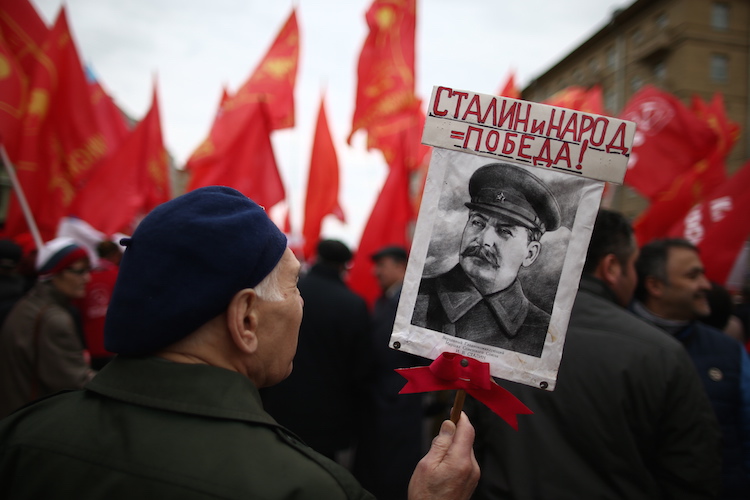In this week’s media highlights, Hannah Thoburn analyzes in the Foreign Policy the reasons for Stalin’s resurrected cult of personality. In Foreign Affairs, Edward Lucas argues that despite the findings of the Litvinenko inquiry Russia and the United Kingdom will continue business as usual. And Nicolas Gvosdev in his commentary for the National Interest discusses the effect of low energy prices on the Russian companies.

As many observers note, Vladimir Putin is using the memory of Stalin to exhort the Russian people to sacrifice. Photo: Stanislav Krasilnikov / TASS
For Putin, For Stalin
Hannah Thoburn, Foreign Policy
In 2015, Stalin’s resurrected cult of personality reached new heights, focusing on wartime sacrifices, writes Thoburn. And Putin is taking tips directly from the Soviet dictator’s book, evoking the worldview in which Russia is besieged on all sides, with only a great leader to save them. And Russians seem ready to forgive everything as long as Putin delivers.
The Litvinenko Affair: An Anglo-Russian Exercise in Futility
Mark Galeotti, The Moscow Times
Galeotti argues that the Litvinenko reveals “the stark limitations of overt and covert power in the modern world.” On the one hand, the Kremlin succeeded in killing its enemy but gained little in the process. On the other hand, after the inquiry into his death, London gained a moral and legal basis to act against the Kremlin, but the sad irony is that there is very little that it can meaningfully do.
License to Kill
Edward Lucas, Foreign Affairs
The Litvinenko affair continues to cause a great stir in the United Kingdom. According to Lucas, the British government struggles to acknowledge that Russian hitmen can operate with impunity on its soil as it is not ready for a full breach of diplomatic ties with Moscow. The Brits cite realpolitik as a reason for maintaining relationship with the Kremlin, but Lucas argues that in reality “too many people benefit from these arrangements to want them to change.”
How the West Misjudged Russia. Part 3: Shades of Pragmatism
Lilia Shevtsova, The American Interest
Shevtsova continues her series of articles on the way Russia and the West see each other. She notes that the pragmatists faction among Russia experts is not monolithic and details various strains of this group—from objectivists to “Putin’s explainers” to traditionalists. Shevtsova also argues that one of the reasons for the West’s inability to understand Russia is the decline in Russia studies in general due to decreasing funding. Still, she insists that the key factor is “rejection of the normative criteria in the analytical process.”
Can Russia Survive Cheap Oil?
Nikolas Gvosdev, The National Interest
Gvosdev writes that low energy prices do not strike at the mere profitability of the Russian oil companies whose break-even production is estimated to be in the mid-teens (about $15 per barrel for Gazpromneft), but they do undermine Russia’s status as the world’s energy superpower. Some observers hope that the crisis may pressure Putin into conducting meaningful structural reform of the Russian economy but Gvosdev argues that favorable geopolitical factors may provide the Kremlin with silver linings.

